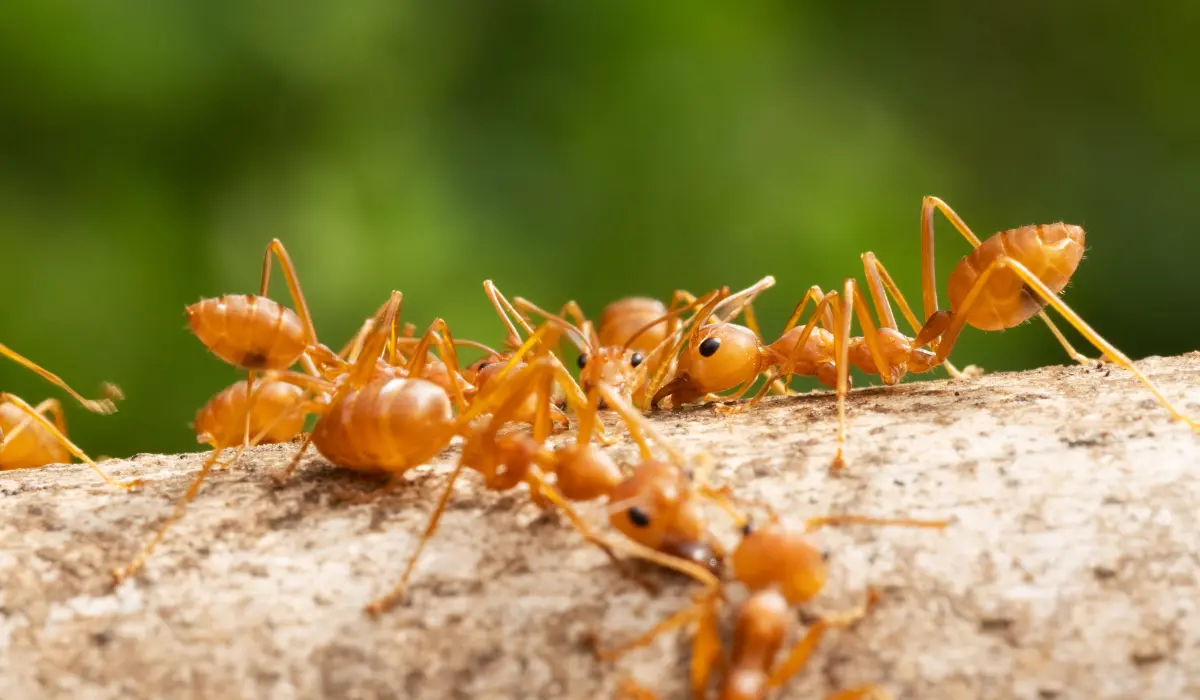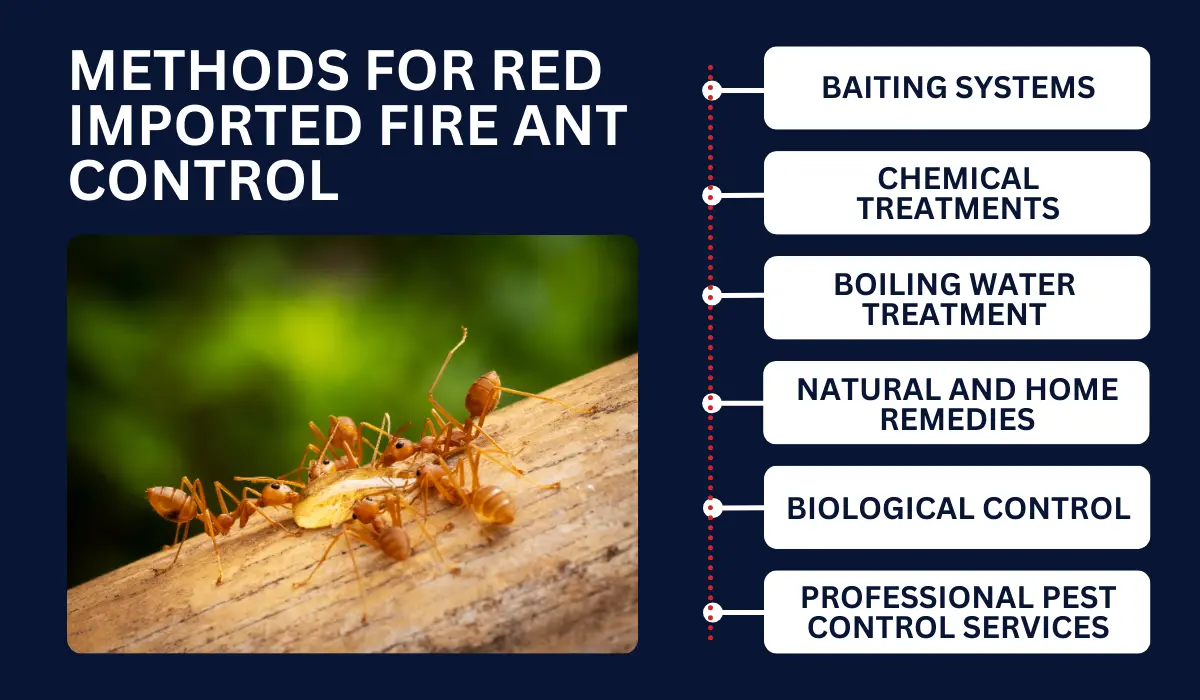
Battling fire ants means tackling their love for Louisiana’s warm, wet conditions. These pests sting painfully and wreak havoc on landscapes and equipment.
Effective control involves strategic granule baiting—where ants bring the poison back to their colony—and direct individual mound treatments for quick results.
Wondering how to keep them gone for good? Keep reading for expert tips on sustaining fire ants and keeping your outdoor spaces serene.
Key Takeaways
- Combining baiting systems and chemical treatments can effectively target and control fire ant populations.
- Options like boiling water and natural remedies such as vinegar or diatomaceous earth are environmentally friendly methods to manage fire ants.
- Regular upkeep, like mowing, debris removal, and landscaping modifications, can help prevent fire ant colonies from establishing.
- Professional pest control services should provide tailored and effective solutions in severe or risky infestations.
METHODS FOR RED IMPORTED FIRE ANT CONTROL

Effective fire ant control typically entails a comprehensive approach, combining immediate DIY pest control actions with long-term management strategies.
1. Baiting Systems
Baiting systems target the entire colony by exploiting fire ants’ foraging habits. Worker ants carry the bait back to the colony, reaching the queen and other members.
Consider these fire ant bait active ingredients (Unfortunately, no grits) and their recommended amount:
- Hydramethylnon (i.e., Amdro): Apply in the late afternoon for effective overnight foraging.
- Indoxacarb (i.e., Advion): Spread during warm, dry conditions when ants are actively foraging.
2. Chemical Treatments
You can apply insecticides to fire ant mounds or over an entire yard to control fire ants. Some fire ant killer products to consider include:
| Chemical Types | Usage Method | Target Area |
| Acephate | Mound treatments | Specific mounds |
| Pyrethrin | Spray application | Perimeter of property |
| Granular Products | Broadcast with spreader | Entire yard |
| Mound Drenches | Pour directly on mounds | Specific mounds |
3. Boiling Water Treatment
Pouring boiling or hot water over fire ant mounds can kill the ants inside, but it requires caution. Remember this safety checklist:
- Wear protective clothing: Long pants, closed-toe shoes, gloves, and eye protection are recommended to minimize the risk of burns and stings.
- Clear the area: Move away any flammable objects or items that could be damaged by hot water.
- Have a ready water source: Ensure you have a steady flow of hot water available to complete the treatment.
4. Natural and Home Remedies
Items commonly found at home can discourage fire ant activity without harsh chemicals. Here are some natural remedies you can use:
| Items | Usage Instructions |
| Vinegar | Mix with water and spray directly on mounds. |
| Diatomaceous Earth | Sprinkle around and on top of the mound. |
| Boric Acid | Create a solution with sugar and water, then apply it to areas where ants are active. |
5. Biological Control
Natural predators and diseases can help manage fire ant problems with minimal human intervention. Available species for homeowners like you include:
- Nematodes: These microscopic worms can be introduced into the soil and target fire ant larvae.
- Fungi: The fungus can be spread near mounds, infecting and killing foraging ants.
6. Professional Pest Control Services
Sometimes, infestations are so extensive or complex that common pesticides fail. Professional services can offer tailored solutions to kill fire ants, such as:
| Service Options | Description |
| Custom Treatment Plans | Tailored to the specific needs of your property. |
| Ongoing Maintenance | Regular visits to keep ant populations under control. |
HOW TO PREVENT FIRE ANTS FROM COMING BACK
To keep fire ants at bay, you should focus on yard upkeep, strategic landscaping, and vigilant monitoring.
Regular Yard Maintenance
Regular yard upkeep is a surefire way to discourage fire ant colonies from settling in infested-prone states like Louisiana and Texas.
Here are some maintenance tasks for the entire neighborhood:
- Mowing: Keep grass short to expose the ground surface, which deters fire ant mounds.
- Raking: Regularly rake leaves and debris to minimize nesting materials.
- Debris removal: Clear away piles of wood or clutter where fire ants can establish a colony.
Landscaping Modifications
Altering the landscape can be a natural deterrent for fire ants and other pests like fleas and cockroaches. Consider different strategies you can utilize, such as:
| Strategies | Description |
| Stone Barriers | Place stones around the garden to obstruct the ants’ path. |
| Repellent Plants | Include plants like mint or marigolds, which can repel ants. |
| Proper Mulching | Apply mulch correctly to avoid creating ideal conditions for ant nests. |
Monitor and Respond Quickly
Spotting fire ant activity early and responding swiftly is crucial in preventing infestations. Heed these signs and actions during your regular monitoring:
- Look for individual mounds of loose soil, especially after recent rain.
- Watch for increased ant presence or movement along consistent trails.
- When detecting fire ants, promptly apply an appropriate bait or contact a pest control professional.
- When controlling fire ants, always refer to trusted resources, such as entomologists at LSU AgCenter.
SHOULD YOU GET IN TOUCH WITH PEST CONTROL PROFESSIONALS?
While there are measures you can take on your own, if the fire ant situation looks overwhelming or risks your health, it’s wise to contact pest control services.
Whether you’re in Baton Rouge or New Orleans, seeking expert help should be easy. For immediate intervention for a severe infestation, let Lajaunie’s ant control specialists tailor a solution that’s right for your home.
For more information about the areas we service, visit our location page.